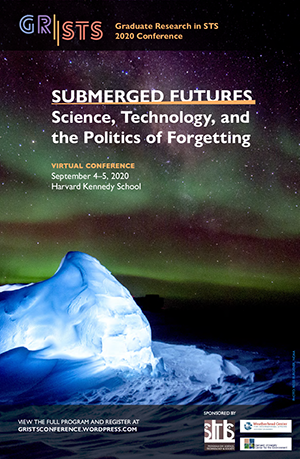Program on Science, Technology and Society at HarvardHarvard Kennedy School of Government | Harvard University |
|||||||
|
|
Conference for Graduate Research in STS (GRiSTS)September 4-5, 2020, AbstractThe first annual GRiSTS Conference has been rescheduled to take place virtually on September 4-5, 2020. This Northeast regional graduate conference is meant to be an opportunity for students of Science, Technology, and Society (STS) from across disciplines and universities to meet and develop their projects together and to benefit from working closely with senior faculty in the field. The GRiSTS virtual program provides opportunities for the Northeast regional STS community to share and advance our work, augment our professional training, and sharpen our capacity for thinking more critically about submerged futures in global and local societies. More information is available at https://gristsconference.wordpress.com/. Please register here before September 1st.
2020 CONFERENCE THEMESubmerged Futures: Science, Technology, and the Politics of ForgettingScience and technology (S&T) have long promised to liberate humankind from present ills and future perils. Progress, in this view, comes through new avenues for knowing, making and governing the future for the common good. Yet, as scholars of Science, Technology and Society (STS) have repeatedly shown, such technoscientific promises displace or exclude other avenues for human progress and flourishing. Like the rising oceans that make cities into ruins, the tides of technological innovation submerge the very traces of paths not taken and wash out other visions for possible futures. In this moment when many of the 20th century’s emancipatory promises, including those of technological progress, have begun to ring hollow, there is a need to recover submerged futures — not for nurturing nostalgia but to surface positive alternatives to the faltering politics of progress. This conference invites work from graduate students in STS and neighboring fields to discuss the topic of submerged futures across a broad range of historical and contemporary topics, including AI, biotechnology, information and communication, medicine, economics, geoengineering, oceanography, climate science, city planning and others. Papers might explore: how some theoretical ideas in these research fields are abandoned or set aside as marginal; how particular efforts to steer progress fail to gain traction; how some policy and governance pathways get closed down by technological innovation; and what distributive consequences arise from forwarding some visions of progress at the expense of others. |
||||||
